Eddie Murphy and Arsenio Hall on ‘Coming 2 America’
Eddie Murphy and Arsenio Hall are back with the sequel to ‘Coming to America’... ‘Coming 2 America’. They spoke to Dave Itzkoff about how the film came to be
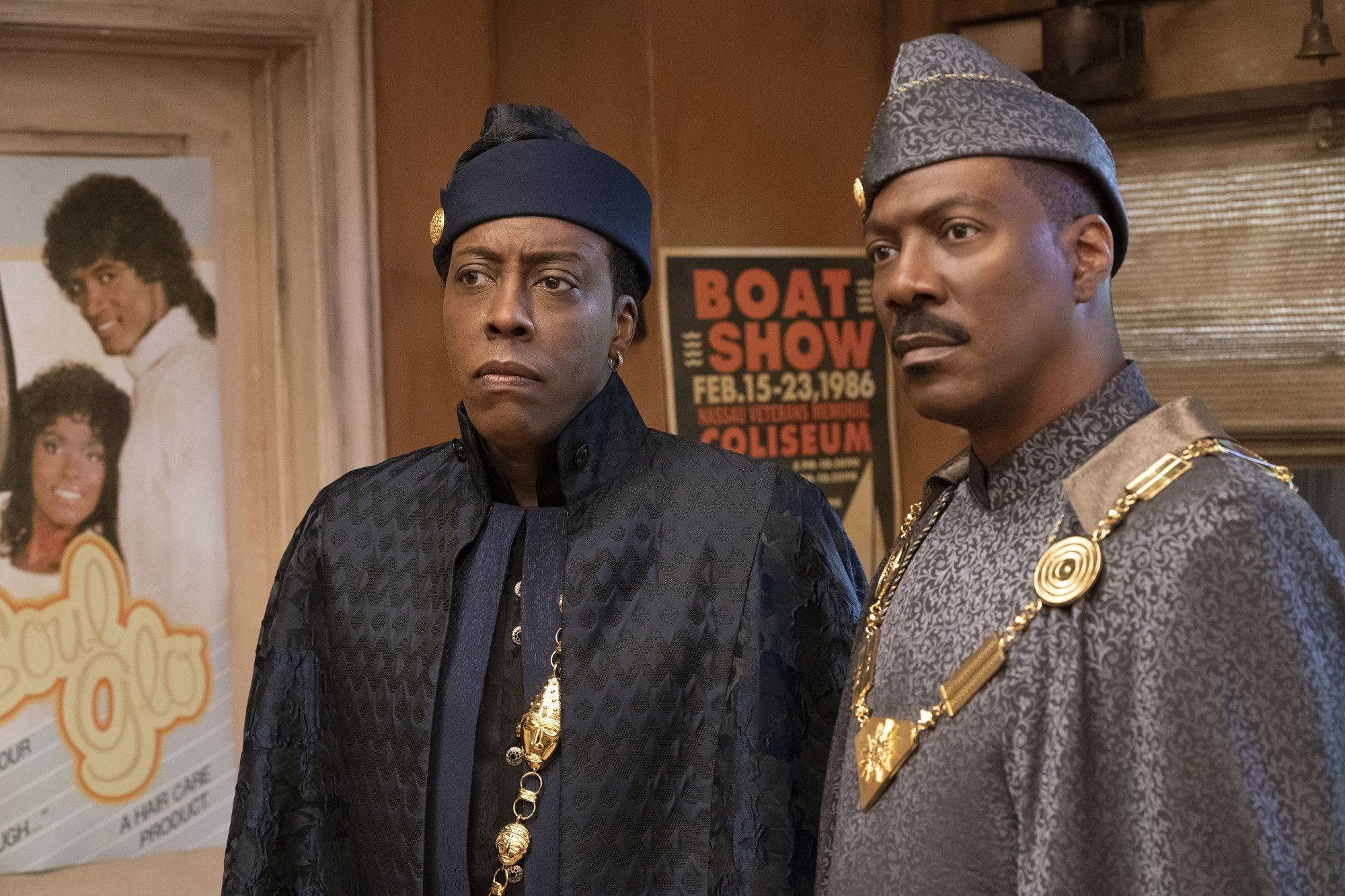
There was a time when Eddie Murphy ruled the multiplex like a king — or at least a prince.
In the 1980s, he capped off a series of comedy blockbusters (48 Hrs, Trading Places, Beverly Hills Cop) and stand-up sets (Raw) with Coming to America. That 1988 film cast Murphy as Prince Akeem, the wealthy potentate of the fictional African nation of Zamunda, who travels incognito to New York with his faithful attendant, Semmi (Arsenio Hall), in search of a woman who will love him for himself.
Coming to America, directed by John Landis, was propelled by his chemistry with Hall and their aptitude for playing countless other characters, including an unctuous reverend (Hall), a mediocre soul singer (Murphy) and the squabbling denizens of a local barber shop (Murphy, Hall and Murphy).
Murphy has had many career highs and lows since, although he has lately been on an upswing that includes his hit 2019 biopic, Dolemite Is My Name. And now he’s returning to Zamunda in a long-awaited sequel, Coming 2 America, which Amazon releases today (5 March).
The follow-up, directed by Craig Brewer, finds an older Akeem reckoning with a grown daughter (played by KiKi Layne) who wants her own opportunity to rule the kingdom. He rushes back to New York with Semmi after learning that he fathered a son (Jermaine Fowler) there on his original visit. Murphy and Hall reprise several of their supporting characters, joined by Coming to America alumni James Earl Jones, Shari Headley and John Amos, as well as franchise newcomers such as Wesley Snipes, Tracy Morgan and Leslie Jones.
The making of Coming to America and its sequel is a story that spans the real-life friendship of Murphy and Hall, from their first encounter as stand-up comics to the present day. Murphy and Hall got together recently for a video interview to talk about the creation of Coming 2 America and their camaraderie, and to needle each other as only good friends can.
These are edited excerpts from that conversation.
Q: How did you first meet?
Eddie Murphy: When we started doing comedy, there may have been, like, 10 Black comics in all of the country, so everybody knew each other. Comics are very cliquish, so you get in a clique with the people you think are funny. Of the 10 Black comics, there were four or five that I never became friends with. (Laughter) When I came out here (to Los Angeles), I met Arsenio through Keenen [Ivory Wayans].
Arsenio Brown! It actually has a ring to it. Arsenio Hall sounds kind of stagy, like he made it up. Arsenio Brown sounds like a real person
Arsenio Hall: We’re standing in front of the Improv, Keenen introduces me, I shake Eddie’s hand and we talk for a while and then coming down the street is Damon Wayans. But I had never met him. Keenen introduces us to Damon and he’s doing that character that Eddie let him do eventually in Beverly Hills Cop, the hotel guy. It was so convincing, I didn’t laugh because I didn’t know whether it was real. But that’s how he got the role in Cop 1.
Q: Eddie, what got you interested in the idea of seeing America and New York through the eyes of this African prince, Akeem?
EM: This was at the height of when I first got in the business. I was on tour and had just broke up with a girlfriend, and a conversation started on the tour bus about wanting to meet a girl that didn’t know I was this dude and just liked me for me.
Q: Arsenio, at that point I think your only movie credit was a comedy sketch in Amazon Women on the Moon. How did you get involved in the original film?
AH: It’s funny, I was not a movie star, I was a stand-up comic...
EM: Oh, no, no – he also did an episode of [the revived] Love, American Style. He’s with a Soul Train dancer named Damita Jo Freeman and they play a couple. I’ve looked all over. I looked on YouTube, but I can’t find it. We were friends, and I always like to be with some other comedian, to make it as funny as it can be. There’s me and Richard [Pryor in Harlem Nights], there’s me and Arsenio, me and Martin [Lawrence in Life]. I’m not going to be shouldering this s*** by myself.
AH: But it’s funny you mention Amazon Women – Eddie and I are riding through Manhattan in a new white Corvette he had bought and Eddie says we’ve got to find somebody to direct this movie. And I remember saying, well, I’m not going to be much help, because I’ve only done one movie and it was with John Landis, called Amazon Women on the Moon. And I saw something go off.
EM: You know what’s funny? John Landis says to me, “You know who’s really funny? Arsenio Brown.” I was like, “Arsenio Brown? Arsenio Hall.” “Oh, yes, Arsenio Hall.” To this day, he’ll still call himself Brown.
AH: I think Rev Brown came from that joke.
EM: Arsenio Brown! It actually has a ring to it. Arsenio Hall sounds kind of stagy, like he made it up. Arsenio Brown sounds like a real person.
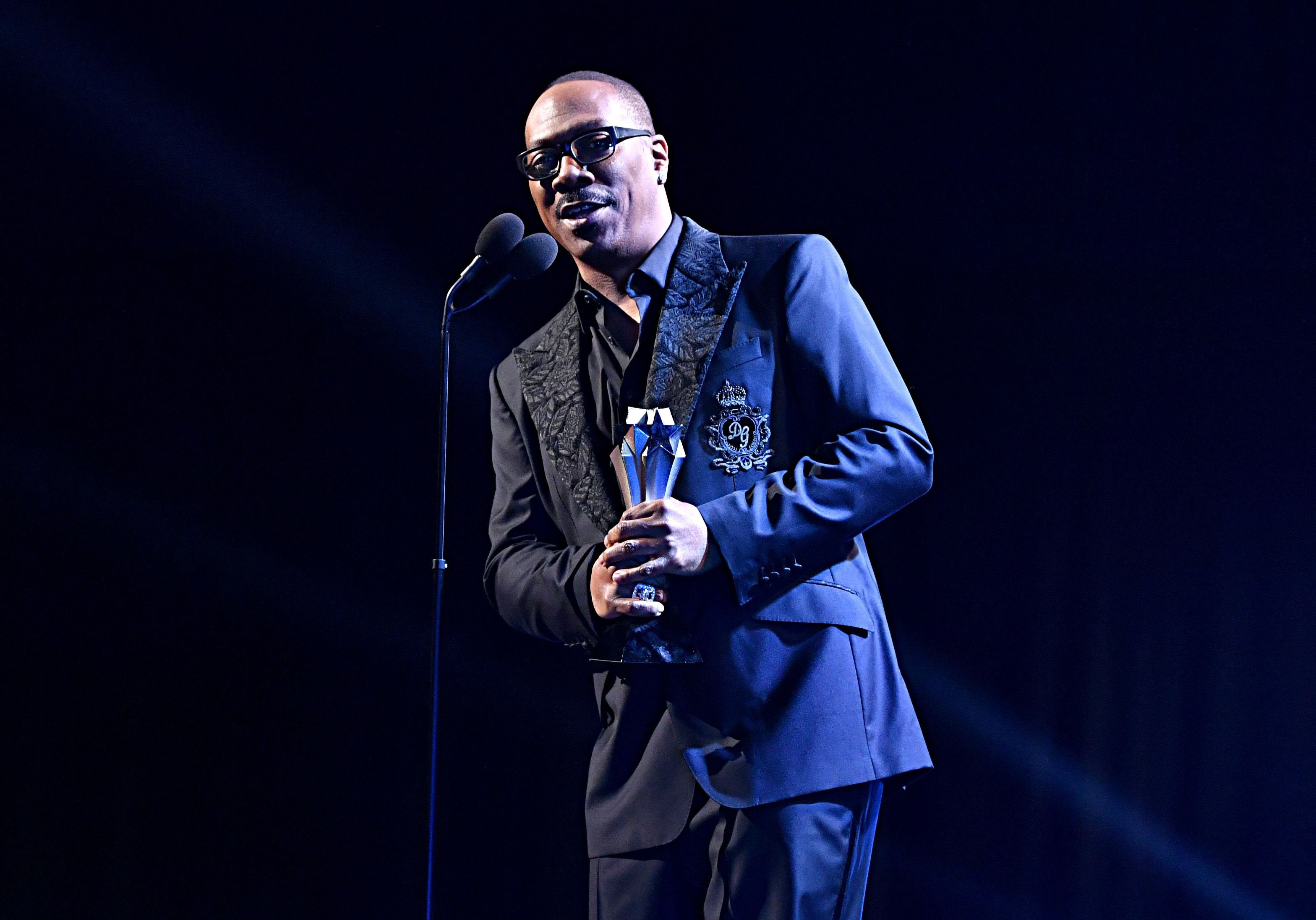
Q: Whose idea was it to have you play multiple characters in the movie?
EM: The original idea didn’t have multiple characters. Once John Landis got involved, he knew I was able to do the Yiddish accent, so he was like, that would be hysterical. He had worked with [special make-up/effects designer] Rick Baker before, so he was like, Rick could make you look like an old Jewish man – that would be hysterical. And that’s how that stuff started.
Q: Your careers went in very different directions after Coming to America. Did that make it difficult to remain in each other’s lives?
EM: There’s never been a period where we haven’t been friends.
AH: We can share different experiences. Part of it is being comfortable with who you are and knowing who you are. I’m a stand-up comic and a guy who does TV. Eddie is a movie star. But we share with each other because the bottom line is we’re both comfortable in our own skin.
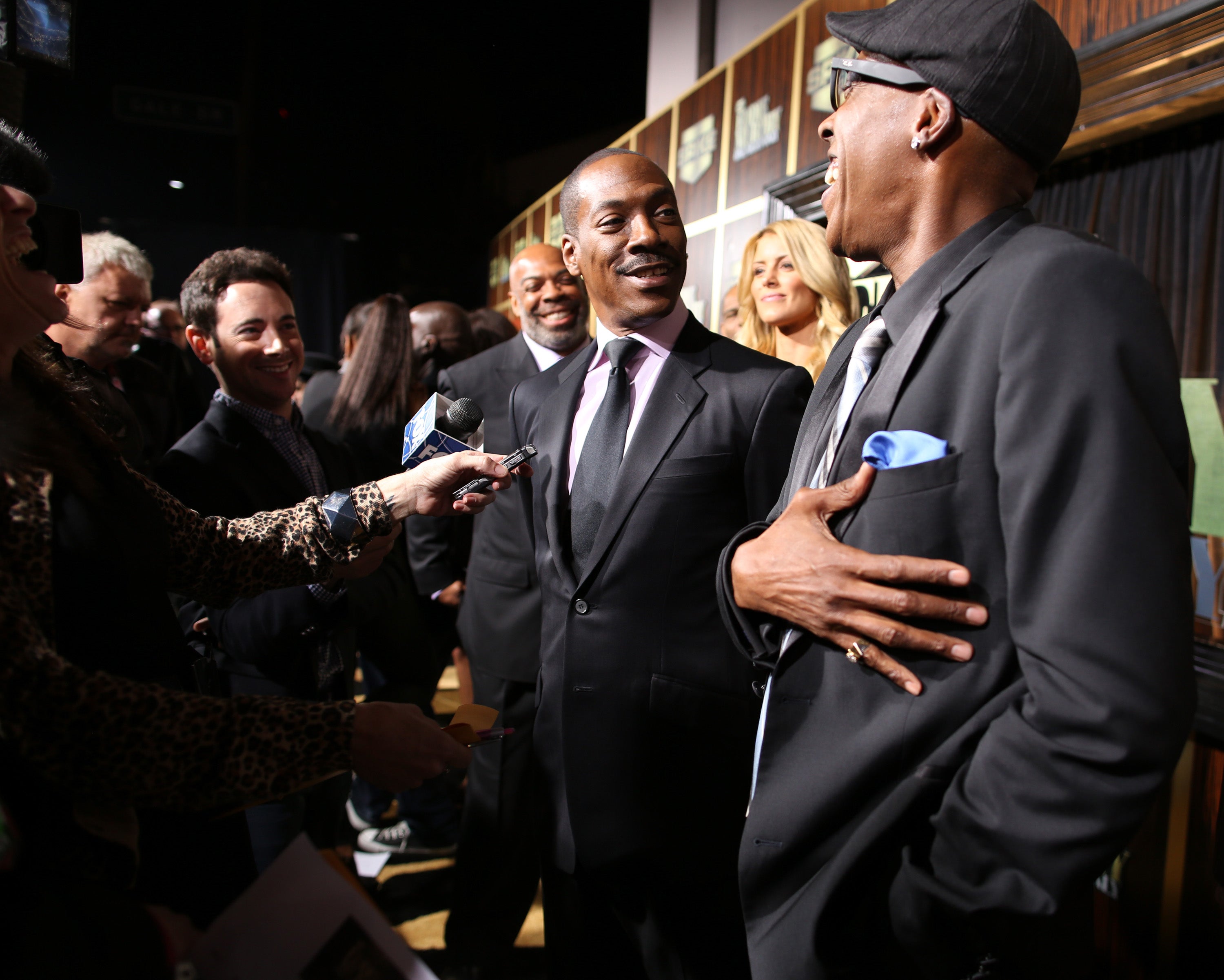
Q: What’s something that’s different about the two of you?
AH: I’m here ’cause I’m broke – he’s here ’cause he’s good.
EM: I don’t see myself as a movie star or a comedian or any of those things. I see myself as an artist. And I feel like there’s a bunch of different ways I can express myself.
AH: You can pop by Eddie’s, and he’ll play a song for you. And you can’t even believe, wait, that’s you on guitar? That’s you singing? You wrote and produced this track? And that’s what he does for fun. For him it’s like crocheting a hat.
EM: I have so many tracks and collaborations with people – Michael [Jackson], El DeBarge – all these people I’ve been in the studio with over the years and never finished it or never released it.
AH: He does so many things. He does them as well as anybody else. He’s a beast. It’s hard to deal with.
Q: What took you so long to make a sequel to Coming to America?
EM: We never thought about doing a sequel. The way the story ended was kind of like, “And they lived happily ever after.” Then all this time passed and the movie became this cult thing. Catchphrases from the movie start working their way into the culture. Stores turning themselves into McDowell’s. I see Beyoncé and Jay-Z dressed up like the Zamunda characters for Halloween.
That stuff you see where I’m walking on the African plain and there’s antelopes running – that’s Rick Ross’s backyard
Then Ryan Coogler, before he directed Black Panther, I meet with him and he says, I want to do a Coming to America sequel. He had an idea for Michael B Jordan to play my son and he would be looking for a wife. I was like, then the movie would be about the son, it’s not our characters, we already did that. It didn’t come together.
But all that made me start thinking, maybe we should do a sequel. I saw the Terminator movie [Terminator Genisys] where they made Arnold Schwarzenegger young – his face looked like Arnold, but young – and that’s where I got it. (Snaps fingers) If we use that to make us young and create a new scene in the club [from the original Coming to America] where we’re out looking for the girls, so it’s part of that night. I go home with a girl and I’m high – that was the piece we needed to start the flow.
AH: I never thought about it because we had always said we’re going to leave Coming to America where it is. But I text him sometimes when I do my coffee run in the morning, and he says, “What are you doing? I think you should read this script now.” And I read half of it sitting in his yard. It was so exciting and so good.
Q: Did the lawsuit won by Art Buchwald, who said Coming to America was based on a treatment he wrote, affect your ability to make a sequel?
EM: Oh, not at all. I’m not even sure how all that stuff was resolved, what the exact wording was. But at the end of the day, I think it’s all good. In the credits, they give a thank you to the Art Buchwald estate.
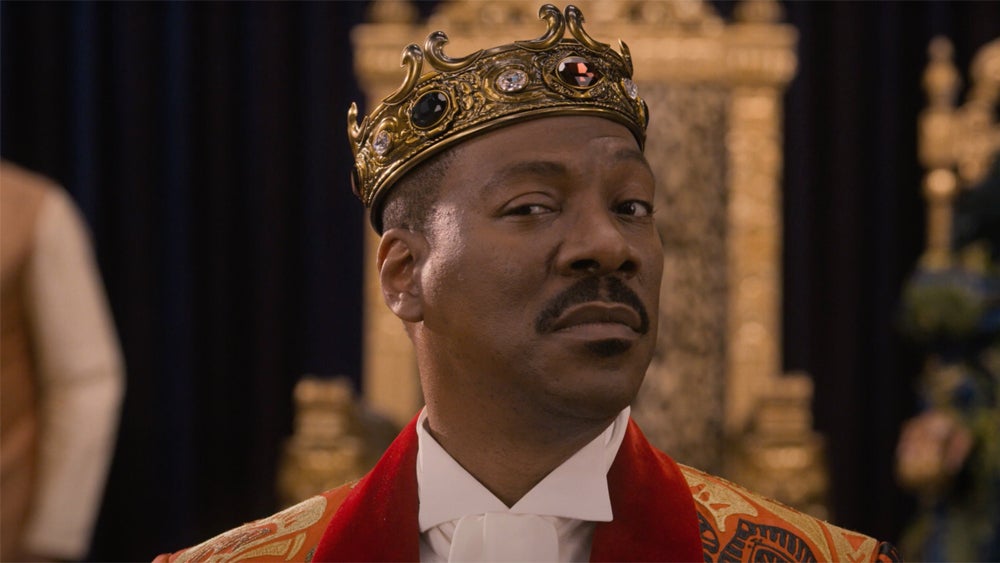
Q: In both films, we see Zamunda as this nation where Black people are able to fulfil their potential and achieve greatness without white people interfering or oppressing them. Was that a point you were trying to make explicitly?
EM: We never say that. We never show you the history of the country. We just are. We’re like Wakanda.
AH: And how perfect to do Coming to America 2 in Atlanta, where it’s very hot and the palace actually is owned by Rick Ross.
EM: Yeah, his house is so big, we literally were able to dress it and make it look like a palace. That stuff you see where I’m walking on the African plain and there’s antelopes running – that’s Rick Ross’s backyard. He has like 300 acres or something.
AH: And a lake! Do you have a lake? You’ve got to start rapping. Let me hear you say (Rick Ross voice), “Hunh.”
Q: Were there any character bits that were written for the sequel but didn’t make the cut?
EM: There was a draft where the barbers had on Maga hats and it turned out that they were Republicans. But it wasn’t because they were for Trump – they were Herman Cain supporters. We thought it was funny, but it kind of dates the movie if we do this. We had these two old goat herders that had a dispute over a goat, and it was very funny but it culminated in, one of these guys f***ed this goat. It was like, uhhhh, we’ve got James Earl Jones in this movie – let’s keep it all classy. In the early drafts, Tracy Morgan was my son.
AH: I’m like, I love Tracy and he’s the funniest guy in the world. But yo, Ed, y’all about the same age. (Murphy voice) “We’ll work it out, man, we’ll figure it out. He’s funny.”
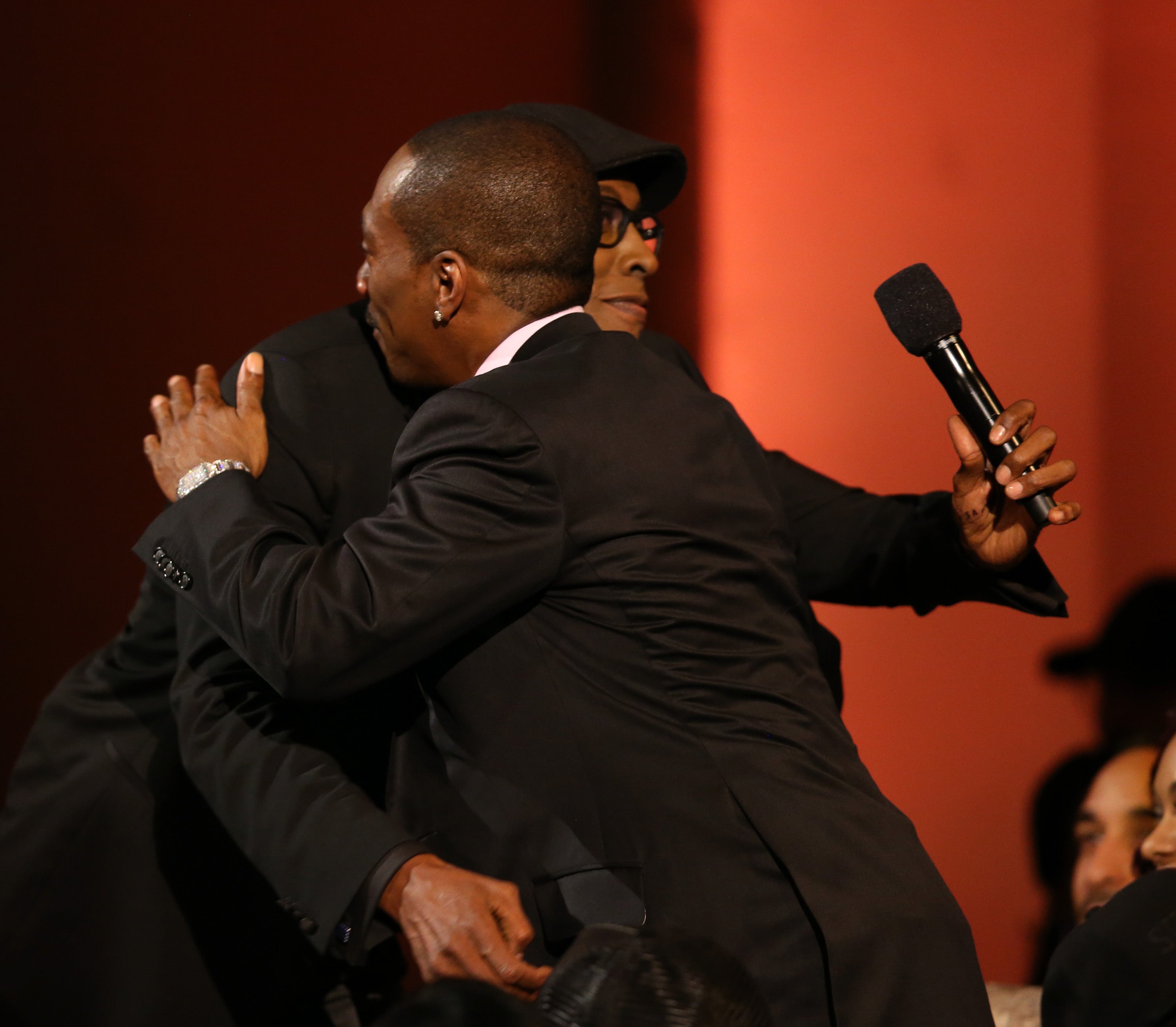
Q: Did the barbershop guys remain eternally the same age?
EM: You look at the make-up – we aged them up nice and good. They’re supposed to be in their late 80s, early 90s now. Looking at the first one, I was amazed at how young we looked – the skin is tight, Saul [the barbershop patron], there are no age spots on his face, his face is all even-toned.
Q: What do you do to pass the time when you’re in the make-up chair?
AH: It’s funny because we go to different places. We can’t be in the same trailer. He watches certain things and I watch certain other things. We tried it, the first day, together, and there were times when I didn’t want to see Prince videos.
EM: Oh, you didn’t want to see MonoNeon?
AH: Oh, God!
EM: MonoNeon – what’s the best way to describe him?
AH: Something that makes Arsenio need his own trailer.
If I’m thinking about my legacy – and I rarely do – my career never even comes into it. My legacy is my children
EM: MonoNeon is a musician who plays bass and he’s unbelievable. He’s Jimi Hendrix and Basquiat and Skittles, all combined. I could watch it for hours and hours and hours and hours. “You’re watching MonoNeon again?!”
AH: I’m a news junkie and I’ll watch the left, the right and the centre, all day long.
EM: I’m the exact opposite. Before the pandemic, I never, never watched the news. I never know what’s going on. I’ll be like, “What happened?” “Trump is the president!” I totally don’t follow any of that stuff.
Q: In the new movie, we see Akeem adjusting to changing times and reckoning with the desires of his grown children. Eddie, is this at all a metaphor for your life? Are you starting to think of the legacy you’ll someday leave behind?
EM: If I’m thinking about my legacy – and I rarely do – my career never even comes into it. My legacy is my children. When I’m dead, and they’re doing my eulogy, ain’t nobody going to be standing over the coffin talking about, “And then, he did 48 Hrs, which was a wonderful film. Burst on the scene with Nick Nolte and shook up the world. Moved onto Trading Places and then the great Beverly Hills Cop. And then the classic Raw – let’s show a clip.”
AH (indicating the array of trophies that Murphy is seated in front of): I know you think those awards behind him are for show business, but those are Daddy of the Year awards.
EM: One for each child.
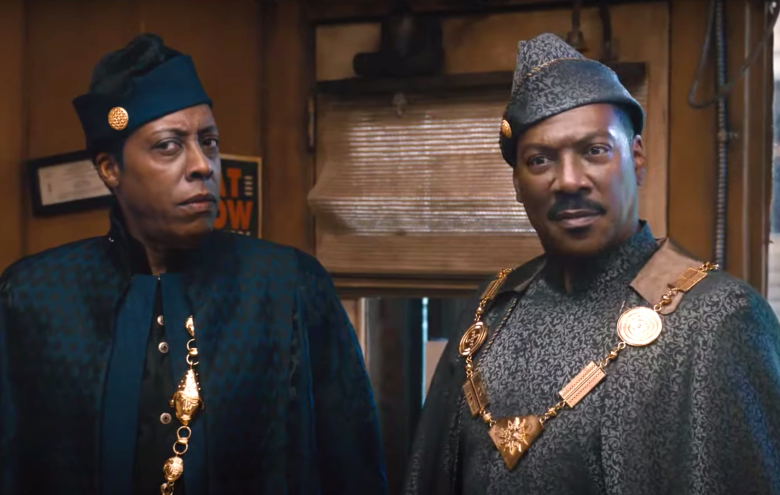
Q: Do you have any plans for another collaboration?
AH: I think it’s back to the comedy clubs for me. I’ll be at the Milk Through Your Nose in Canada next Friday.
EM: The plan was for all of us to be doing stand-up. When I got up off the couch and did this little patch of work, it was, let’s do Dolemite. Let’s do Saturday Night Live. Let’s do Coming 2 America. Because I want to go do stand-up again, but I don’t want to just pop up out there when people hadn’t seen me be really funny in a while. I didn’t want to do stand-up after the last movie you’ve seen me do is Meet Dave. Let me remind them that I’m funny. And then the pandemic hit and we had to pull everything back. But when the pandemic is over and it’s safe to be around people, I’m going to go do stand-up again. There’s so many comics in Coming 2 America. I’d love to do a tour with all the comedians, me, Arsenio, Leslie Jones, Tracy Morgan, Trevor Noah, Jermaine Fowler, Louie Anderson, Michael Blackson.
Q: Is it perilous for the two of you to hang out in public? If people see you together, do they just start quoting Coming to America?
EM: We haven’t been out in a year because the bottom fell out of the world. But when the world gets back to normal, I don’t have a problem going anywhere. When I was young I used to have bodyguards. Then one day it was like, hey, wait a second – I don’t need all these bodyguards! And I haven’t had them since. I don’t restrict my movements or not go to places. When you go somewhere, you just say, “What’s up?”, take a picture and keep it rolling.
AH: I can’t wait for those times to come back. The only problem with Starbucks is Eddie’s a big tipper. When I go back alone, there’s always this look, like (mimes someone looking behind him to see if Murphy is also coming). I leave $5. Eddie will leave them a Rolls-Royce tyre.
© The New York Times
Join our commenting forum
Join thought-provoking conversations, follow other Independent readers and see their replies
Comments



Bookmark popover
Removed from bookmarks